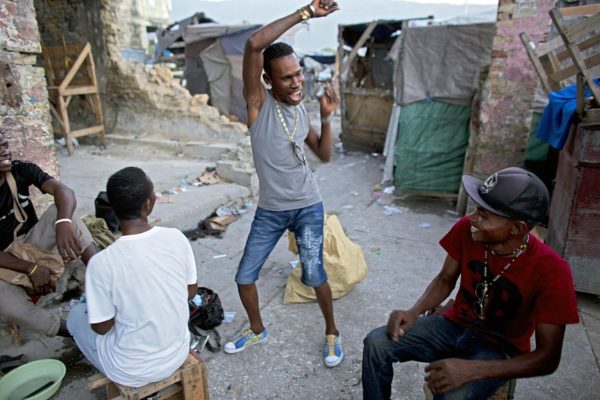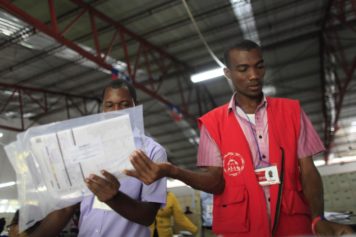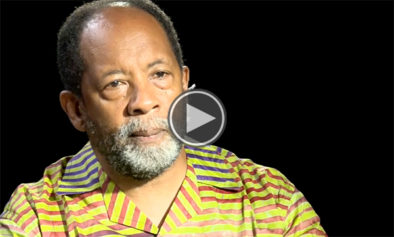Sitting inside the Day-Glo-colored nightclub that he runs on a hillside speckled with squat cement houses, Christla Chery, 32, pushes his baseball cap back on his head and outlines his community’s problems.
“We don’t have water, we don’t have electricity, we don’t have anything here. The state is completely absent from this neighborhood,” he says, as the Caribbean winds clatter over the zinc roof. “This is a prison where we are deprived of our liberty. We would like the freedom of every person here to enter society.”
The neighborhood of Ti Bois, where Chery has his nightclub, wraps like a necklace around the southern hills of Port-au-Prince, Haiti’s capital. The city pulses below: a nearly silent tableau of the tumbling azure ocean, curling smoke rising from burning garbage and thousands upon thousands of cars.
Though many refer to Chery and his compatriots as gang leaders, they have a different perception of themselves and their armed followers, whom they refer to as the baz – the base of the neighborhood. Chery and his men enact a role that falls somewhere between political pressure group, warlord and tax collector, gathering tolls from the various supply trucks that pass along the narrow lanes.
The baz within Martissant – the larger neighborhood of which Ti Bois is part – have often been in conflict among themselves. Despite being in a strategic location in the city – it overlooks the main road to the south of the country – Martissant was offered precious little by the state, even before the country’s devastating January 2010 earthquake. The baz have functioned in that power vacuum for years as a kind of de facto community government. Now, with Haitian elections scheduled for this year, the various baz are working to maintain a tense peace between themselves.
Haiti’s leaders have made use of armed groups, some quasi-regular and some not, to impose their will in Port-au-Prince virtually since the country’s founding. The history of the capital city has in part been the history of the fighting between these groups. Now that may be changing. “For years, [the politicians] would ask us to burn tires, to cause disorder … but there was no development,” Chery says. “And we don’t want that anymore.”
Among those trying to facilitate a peaceful coexistence between the various baz in the city is the Lakou Lapè (the name means “peaceful community” in Creole). The 2-year-old group has a mission to promote a culture of nonviolence and dialogue.
“It’s like three steps forward, two steps backward,” says Louis Henri-Mars, Lakou Lapè’s executive director and the grandson of Haitian author Jean Price-Mars, one of the founders of the négritude movement of Black consciousness. “But we know it takes time. Change comes from positive encounters and relationships that make positive connections happen. They allow you to get a different world view to come out of the craziness you’ve been living in.”
Read more: Guardian



